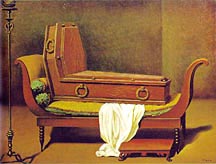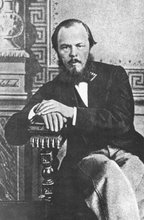
The term "holy fool" is liberally used in "The Brothers Karamazov" in Pevear's translation. Garnett's translation avoids this peculiarly Russian term, which a key concept in understanding "Brothers." The importance of holy foolishness in Russia cannot be underplayed: the magnificent onion-domed St. Basil's Cathedral, in Moscow's Red Square, is dedicated to "Basil the Fool," canonized in 1580. In fact, the Orthodox Church canonized some 30 saints under the rubric of "foolishness for Christ's sake" (Murav 2), while there were many more whom were not canonized, but nevertheless venerated. So central is the "holy fool" in Russian culture, Slavicist
Ewa Thompson argues that the holy fool "code of contrasts" essentially defines the Russian character. Despite the centrality of this form of conduct in Russian culture, Soviet scholars dismissed or minimized the "holy fool" generally, in their critique of Dostoevsky in particular. Bakhtin, indeed, called the "holy fool" device in Dostoevsky as "a sort of form, a sort of aestheticism -- but, as it were, in reverse" (Bakhtin,
Problems 231).
Harriet Murav in "Holy Foolishness: Dostoevsky's Novels and the Poetics of Cultural Critique,"argues, in fact, that Dostoevsky writes "holy foolishly." She writes that "Brothers" is in the form of an icon, with its "glimmering of restoration just beyond its boundaries" (131). The novel, like a traditional icon, has three parts: heaven, earth, and hell. "In the novel, we will see," she comments, "hell takes up the largest part" (135).
Murav describes three basic Russian types of "holy fool": the born fool, like "Stinking Lizaveta," often said to have the gift of augury; the religious person who is also or who becomes or is sporadically mad, like Ferapont; and the purest form, a person who is foolish for Christ, in her words, "a person who feigns madness or folly as an ascetic feat of self-humiliation" (2).
"Stinking Lizaveta" is the perfect exemplary "holy fool" because she was born, not made. She is the kind we recognize most readily, one of God's own special ones (97).
Garnett uses the term "
idiot" here rather than Pevear's term, "holy fool." Father Ferapont is also cited as an exemplary holy fool, as he is clearly mad, but for holy purposes. It is said this is "what fascinated" the monks about him (163). (In Garnett, he is called simply, "crazy," and it is his "craziness" that "attracted" them.) Father Zosima is called a "holy fool" by Rakitin, who says about Zosima's inexplicable prostration before Dimitri: "He predicted the crime and marked the criminal! That's always the way with these holy fools; they cross themselves at the tavern and throw stones at the temple. Like your elder, he takes a stick to a righteous man and falls at the feet of a murderer" (78). In Garnett, Rakitin uses the term "crazy fanatic." This blunt terminology eliminates the possibility of Zosima's foreknowledge or clairvoyance, and slices out the entire discussion about faith and miracles, knowing and forgiving, and the tragic/transcendent nature of Dmitri's fall from grace.
Ivan's tavern scene is foreshadowed in this statement, as well as the possibility of possibilities that Ivan, too, is a holy fool, throwing stones at the temple from the vantage point of the tavern. (This phrase is from a work on folk legends by Afanasiev in 1852, where a worker behaves badly, throwing stones at the church, etc. and it is discovered that he alone sees clearly because he is the angel of God and sees truly what mortals cannot see, the devils circling the steeple (
Buzina 232). Buzina also points out that from the point of view of folklore, Ivan is named the traditional name of the "third son" who is a fool but nevertheless slays the giant, finds the gold, marries the princess, etc.: "
Ivan the Fool" (238). Alas for Ivan Karamazov, he is no fool. Smerdyakov should be a fool, throughout the novel he is identified as an "idiot" because of his illness, but in no way in Smerdyakov a fool. He never acts disinterestedly, even less so than his counterpart, the Devil.
In a way, all holy or even good people are fools, when compared to a sinner like Fyodor or a sensualist like Dmitri. Fydor is very free in calling people "fools," although he prides himself on his "foolishness," which he believes is just an act. Very few of the monks are "foolish." Even the meek Father Iosif has to make little wise editorial comments in Father Zosima's presence. Alyosha is on the way to being a "holy fool," the way he runs around like a chicken with his head cut off. At page 21, the putative "author" says that, vis a vis Alyosha's handling of money, that "anyone who got to know him a little would be immediately be convinced . . . that (he) must be one of those youths, like holy fools, as it were, who, if they were to chance on even a large fortune, would have no trouble giving it away. . . ". Garnett translates "holy fool" in this passage as "a type of
religious enthusiast." None of the women, except Lizaveta, who is dead before we meet her, are fools of the holy sort, although fools they are, to a woman. Katerina Ivanovna, who is most certainly "fooled" by others, and her own pride. In anger, she calls Alyosha a "holy fool" when he insists that she is tormenting Ivan by claiming to love Dmitri (192). In Garnett, she calls him a "religious idiot." Again, in Garnett's translation the penetrating capacity of the holy fool to see through human folly is lost. Ivan follows this exchange with, "You are mistaken, my good Alyosha," then attempts to reason away his flight to Moscow on the morrow.
A fool is, among other things, as we see from Alyosha's example, one who trusts in luck, or, perhaps, in God. Sometimes this fool, his or her eyes clapped on god, sees through the trickery and self-deception of other mortals. Sometimes, like Ferapont, they see angels and devils with such facility they lose touch with the human world, and slip over into simple madness. Dmitri is perhaps just foolish enough to be saved by earthly damnation, Ivan, perhaps, is not so lucky: he slips over this fine line accompanied by the Devil. And the Devil is never a fool.
Photo credit: A beautiful aged Orthodox priest performing liturgy in Kosovo, from a Kosovo Church blog that has disappeared. This old gentleman has an innocent and saintly look I'd associate with a Holy Fool, and his colleagues look to me like Zosima's wise-guy companions at the monastery.








